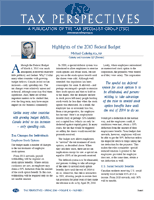
PDF Format
 Issue Contents Issue Contents
 All Issues All Issues
Supplement 2010
Although the Federal Budget of March 4, 2010 was much anticipated, it received relatively little publicity and fanfare. Why? Unlike many other countries with growing budget deficits, Canada levied no tax increases – only spending cuts. The tax changes were relatively minor and technical, although some may find them significant. Also, there are several important matters to be studied that, over the long term, may have major impact on our business community.
Highlights of the 2010 Federal Budget
By Michael Cadesky, FCA, TEP
Cadesky and Associates LLP (Toronto)
Although the Federal Budget of March 4, 2010 was much anticipated, it received relatively little publicity and fanfare. Why? Unlike many other countries with growing budget deficits, Canada levied no tax increases — only spending cuts. The tax changes were relatively minor and technical, although some may find them significant. Also, there are several important matters to be studied that, over the long term, may have major impact on our business community.
Tax Changes for Individuals
Employee Stock Options
The budget made a number of changes to the tax treatment of employee stock options.
From 2011 onwards, payroll withholding will be required on stock option benefits. Where certain conditions are met, an employee may claim a 50% deduction from the amount of the stock option benefit. In this case, withholding will be required only on the net taxable amount.
In 2000, a special deferral system was introduced to allow employees to exercise stock options and obtain stock, but not pay tax on the stock option benefit until the shares were sold. Although well intended, this legislation has been catastrophic for some. It allowed — and perhaps encouraged — people to exercise their stock options and then to hold on to the shares. But the dramatic decline in stock prices left many people holding stock worth far less than when the stock option was exercised. As a result, the employee has an economic loss but, from a tax perspective, the employee has income: there's an employment benefit (fully or perhaps 50% taxable) and a capital loss (which can only be deducted against capital gains). In many cases, the tax that would be triggered on selling the shares would exceed the proceeds received.
The budget now allows employees to "unwind" the tax treatment of stock options, as described above. When they sell their stock, there are no tax implications except for one: a special tax equal to 100% of the proceeds received.
The deferral system is to be eliminated, and persons wishing to take advantage of the rules to unwind stock option benefits have until the end of 2014 to do so. Moreover, this rule is retroactive to 2001, allowing people to restate their tax positions for prior years if they make the election to do so by April 30, 2011.
Lastly, where employees surrendered an unexercised stock option to the corporation, the payments were treated as if they were salary. The corporation would get a deduction in the normal way, and the employees could, if conditions were met, obtain a 50% deduction from the amount of their employment benefit. From budget date onwards, however, employees will not be able to get the 50% deduction unless the employer elects to forgo taking the tax deduction for the payment. This makes the rules symmetric: special reduced taxation is granted to the employees provided the employer does not, at the same time, obtain a tax deduction as well.
U.S. Social Security Benefits
Canadian residents receiving U.S. social security must include 85% of it in income. From 2010 onwards, only 50% will be taxable.
Cosmetic Surgery
Cosmetic surgery will no longer qualify as a medical expense after budget date, nor will it be exempt of GST/HST.
International Changes
Taxable Canadian Property
One of the most significant and surprising changes concerns the definition of taxable Canadian property.
Canada levies tax on gains realized from the sale of taxable Canadian property. Prior to the budget changes, that included shares of Canadian private corporations.
Otherwise, such shares will no longer constitute taxable Canadian property, meaning that non-residents will be able to realize gains from the sale of such shares without having to pay Canadian tax. Prior to this change, such gains would be exempt from Canadian tax only if an international tax treaty provided an exemption for the non-resident.
Non-resident Trust and Foreign Investment Entity Rules
Significant changes are proposed to the taxation of non-resident trusts and foreign investment entities.
The previously announced changes to reform the taxation of non-resident trusts will go forward, effective from 2007.
New rules are now proposed for taxing a non-resident trust where a Canadian resident person has made contributions to the trust. Instead of income being taxed in the trust, and the trust being taxed as if it were resident, now income will be attributed to the Canadian resident who contributed to the trust. This will create a system similar to the U.S. grantor trust system, with apportionment rules where contributions are made by both Canadian residents and non-residents.
Trusts created by non-residents will continue to be exempt from Canadian tax. Trusts to which a Canadian resident has contributed will be exempt until January 1 of the year that person has been resident in Canada for 60 months.
The rules for foreign investment entities — which are to be significantly modified and simplified — will now be effective as of January 1, 2010 (deferred from the original date of January 1, 2007). A Canadian resident holding an interest in a foreign investment entity will have to impute income based on the cost of the investment, at the prescribed interest rate (the Canadian treasury bill yield rounded up to the nearest percentage point) plus 2%, from 2010 onwards. The details of this system have not been fully revealed, and a period of consultation will follow during which these proposals will be developed further.
Other Matters
The government is proposing to study two additional measures, which may have widespread significance. The first is a system of reporting certain tax-motivated transactions meeting predefined conditions. This is designed to detect certain confidential and proprietary tax schemes promoted in Canada. Such plans would have to be disclosed to the tax authorities.
The second matter concerns filing consolidated corporate tax returns. At present, Canadian corporations can only file on a non-consolidated basis. This means that each corporation must file a tax return and report its income as if it were a separate and distinct entity. While Canada's transfer pricing rules do not apply within a domestic context, losses are nevertheless "ring fenced" and cannot be used within a corporate group without going through an amalgamation or other type of corporate reorganization. The possibility of developing legislation to allow for corporate tax filings on a consolidated basis will, if enacted, significantly change the Canadian tax landscape.
| 




